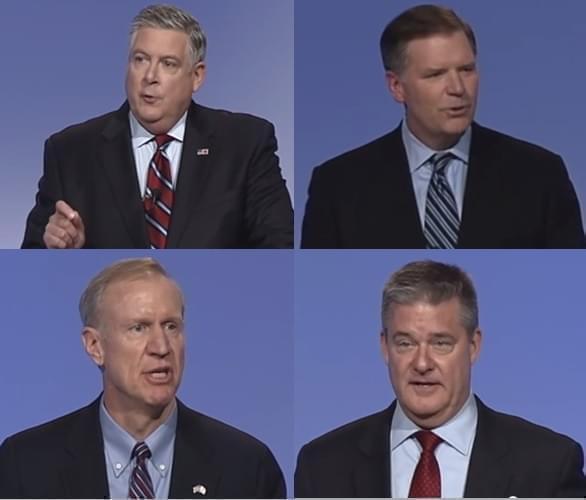Candidates Pitch ‘Electability’ At GOP Debate
The four men competing for the Republican nomination for governor met in Peoria on Thursday night. There were no big blow-ups or arguments. In fact, the candidates seem to agree on a lot of policy issues.
They were participating in a live debate broadcast on public radio and television stations across Illinois.
Debates are supposed to be an opportunity for candidates to set themselves apart, but sometimes their opinions aren’t all that different.

The 2014 Republican candidates for governor debate in Peoria, Ill. on Jan. 23, 2014. From left to right on top: Sens. Kirk Dillard and Bill Brady, and left to right on bottom: Venture Capitalist Bruce Rauner and State Treasurer Dan Rutherford. (Illinois Public Broadcasters)
All candidates had their talking points, including Winnetka businessman Bruce Rauner, who repeatedly cited 'government union bosses' among the problems in Illinois politics.
But on many issues, Rauner is on the same page as state Sens. Kirk Dillard (R-Hinsdale) and Bill Brady (R-Bloomington), and Illinois State Treasurer Dan Rutherford.
Take, for example, fracking. That’s the shorthand for hydraulic fracturing, a controversial technique for extracting oil and natural gas. Southern Illinois is poised to be a hotbed of fracking, but environmentalists worry about groundwater contamination and other problems.
The candidates were asked if, based on the fracking law passed last year, they’d feel comfortable drinking a glass of Southern Illinois water.
Brady: “Yes, I would be happy to drink water in Southern Illinois, based on those rules.”
Dillard: “I’d drink that water.”
Rutherford: “Yes, I’ve enjoyed a glass of water in Southern Illinois. And as governor of Illinois, I plan to continue to drink Southern Illinois water."
Consensus was also the watchword on what could be done to lower costs in Medicaid, the state’s program of health care for the poor, elderly, and disabled.
Brady: “Medical savings accounts can work here. Put the money into a savings account, let them draw down against that, so they can actually save money, waste less.”
Moderator: “A quick response from Mr. Rutherford.”
Rutherford: “Actually I would concur quite considerably with Sen. Brady on that.”
Moderator: “And Mr. Rauner.”
Rauner: “Yes, I do agree."
All this agreement raises the question of why these guys are running against each other.
There is one area in which all four candidates have strongly different opinions: who has the best shot at defeating the presumptive Democratic nominee - incumbent Gov. Pat Quinn.
“I’m electable. I’m a suburbanite with very strong Downstate roots," said Sen. Dillard. "That’s the right template for a Republican to win the election."
Dillard urged Democrats to cross party lines and pull a Republican ballot in the primary.
“If you’re a Democrat or an independent, there’s no action coming up on your side of the ballot on March 18," he said. "Come on over to ours and save your state."
Sen. Brady, meanwhile, touted his experience in statewide elections.
“I’m the only one up here who’s run for governor against Pat Quinn," Brady said. "Yeah, I lost by a few thousand votes. But I went from 150,000 votes in a primary to nearly 1.8 million votes in the general."
While the other were touting their experience, Rauner ran the other way. He has portrayed himself as a political outsider.
“I’m not out looking for a political career," Rauner said. "I don’t need a job. I can’t be bought, intimidated, bribed, influenced. The special interest groups that make their money from government - the government union bosses, the trial lawyers, and others - they’ve bought the politicians in Springfield. They’ve bought the Democrats, and unfortunately, many of the Republicans, too.”
That leaves Rutherford. He points out that, as treasurer, he is just one of two Republicans who has won statewide office since the 1990s.
“I’m a reasonable Republican," he said. "That’s why I win. A Republican that can win in this not blue, but dark-purple state, and been able to do it in Chicago, the suburbs, and Downstate. I want your vote to be the Republican nominee for governor.”
After a 90-minute debate and more on the horizon, the question remains about whether this kind of thing actually matters. After all, far more voters see endless television ads than the handful of serious debates.
University of Illinois political scientist Chris Mooney said at this point, the race is Rauner’s to lose, and that’s mainly because the candidate has been spending so much of his own vast wealth on television ads, while his opponents have been saving their more modest resources for the weeks ahead.
“TV moves numbers. … They see it on TV and say, ‘Yeah, he looks like a reasonable guy, he’s got an $18 watch, I like that Carhart (coat)," said Mooney. "And he’s rich, so he must be smart. I don’t hear anything bad about him, who else is there? I don’t even know. So that’s who I’ll vote for."
Of course, that premise depends on Rauner not having any stumbles. He has already had a couple — a flip-flop on whether to raise or lower the minimum wage, and a story about deaths at nursing homes run by the investment company that made him a rich man.
While polling shows Rauner is the front-runner, there are enough undecided voters that it remains anyone’s race.
Links
- Rutherford Wins Champaign Co. Republican Straw Poll
- Rauner Clarifies Min Wage Comments During Champaign Stop
- Sen. Brady Addresses Pensions, Gov’s Race In Champaign
- Dillard Weighs In On Business, Education, And Rauner At U of I
- Gubernatorial Candidates Dillard, Rutherford Announce Running Mates
- Rutherford Addresses Finances, Same-Sex Marriage in Campaign Swing
- Rutherford Makes Gubernatorial Run Official
